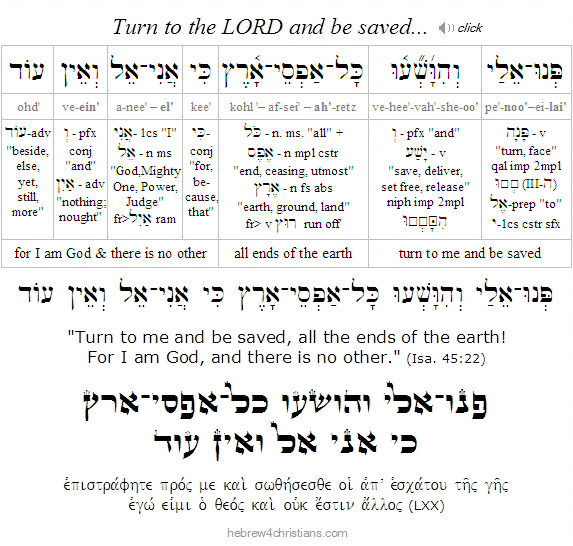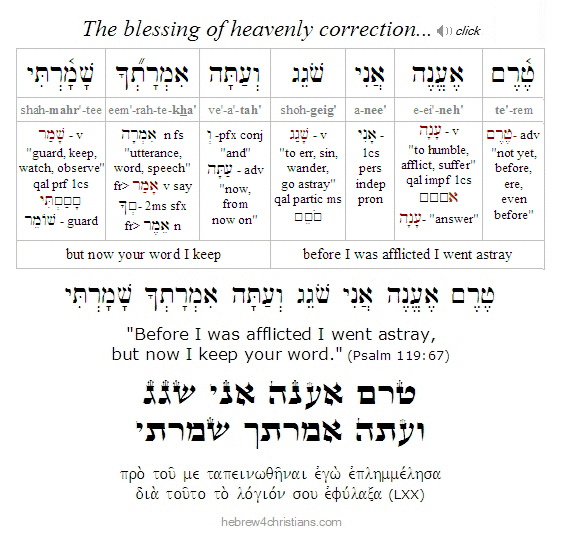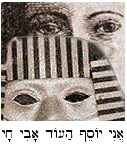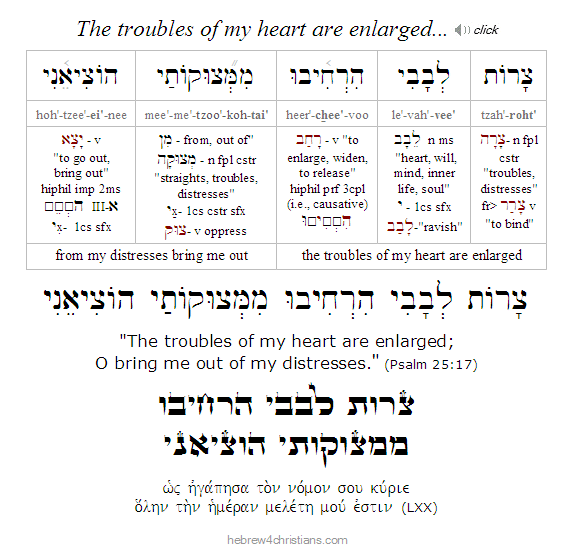|
January 2020 Updates (continued)
Note: If any page content appears to be missing, please refresh the page...
Lament and Healing...

01.03.20 (Tevet 6, 5780) "My eye grows dim through sorrow; every day I call upon you, O LORD; I spread out my hands to you... Help me, O LORD my God; save me according to your love" (Psalm 88:9; 109:26). Such words pierce through the clichés and chatter about religion, theology, and so on, voicing the lament of a soul in trouble, desperately crying out to God for help... The language of prayer is often quickened by affliction and trouble, for the heart senses it must find God or die. "The troubles of my heart are enlarged..." (Psalm 25:17). "Heal me, O LORD, and I will be healed..." for if you will not help, O Lord, then I will perish; I will be consumed in my grief, I will waste away in the void of darkness... "Why is my pain unceasing, my wound incurable, refusing to be healed? Will you be to me like a deceitful brook, like waters that fail?" (Jer. 15:18). O Lord, "I am poor and needy; my heart is pierced within me" (Psalm 109:22).
During hours of pain or mental anguish prayer becomes spontaneous, raw, unscripted and devoid of empty words. Anguish moves us right to the point, bypassing other concerns, distilling the heart's cry for God's help. If you feel overwhelmed, pour out your heart in prayer... It is not the words of the prayer that matter as much as it is the fervor, the intensity of the heart, and the passion that yields itself before God. "Blessed are they that mourn, for they shall be comforted" (Matt. 5:4). "The LORD is near to the broken of heart and saves the contrite of spirit" (Psalm 34:18).
צָרוֹת לְבָבִי הִרְחִיבוּ
מִמְּצוּקוֹתַי הוֹצִיאֵנִי
tza-roht · le-va-vee · heer-chee'-voo
mee-me-tzoo-ko-tai · ho-tzee-ei'-nee

"The troubles of my heart are enlarged;
O bring me out of my distresses."
(Psalm 25:17)

The Fight for Love...

01.03.20 (Tevet 6, 5780) "Whatever does not proceed from faith is sin" (Rom. 14:23). Sin is not so much disobedience to an external code of behavior, however, as much as it is abandoning your trust, your identity, and your hope as a beloved child of God. As you believe so you will behave, and as you behave so you believe... Therefore one of the greatest of sins is to forget the truth of who you really are – a beloved and redeemed child of God! The great temptation of sin is rooted in the lie that we are unworthy people, that God does not really loves us (just the way we are), that He is disappointed in us, and so on. "Self-rejection is the greatest enemy of the spiritual life because it contradicts the sacred voice that calls us the "Beloved." Being the Beloved constitutes the core truth of our existence" (Nouwen). Forgetting who you are leads to forgetting who the Lord is, just as forgetting who the Lord is leads to forgetting who you are.... Therefore the Lord constantly tells us to remember and not to forget the call of his heart, the message of his love.
Sin seduces people to destroy themselves, since it first of all seeks to disown, impugn, and reject what is most important for spiritual life. The devil seeks to murder and destroy all that we need to be eternally healed... And though we might want to escape from this conflict (or to pretend that it's not really here), the battle is intractably real and must be fully engaged until our redemption is complete (1 Pet. 5:8-9). Meanwhile, spiritual struggles can be downright ugly. Would any one deny that the cross of Messiah was a sacred space - and yet it was precisely from there, from the place of blood and suffering and pain and terror, that the grace, beauty, and strength of God for us would shine forth.
To effectively combat the devil, let us first of all pray to the LORD God Almighty and ask for His power, wisdom, and grace to deal with the evil one's devices and strategies used against us (Eph. 6:11-18; Rom. 13:12, 1 Thess. 5:8; 2 Cor. 10:4-5). Since we are not to be ignorant of the devil and his devices (2 Cor. 2:11), let us particularly ask God to remind us of who we really are in the Messiah, and to give us the power of the Holy Spirit to genuine walk in the truth of our sacred identity as his beloved. Let's ask God to help us practically apply the victory given to us in the resurrection of Yeshua. With God's help, may we be bold to take our place at His banqueting table, assured that we are indeed His dear children...
Out of the Depths - ממעמקים

01.03.20 (Tevet 6, 5780) In the midst of his struggle, King David asked the LORD: "How long shall I take counsel in my soul, having sorrow in my heart daily?" (Psalm 13:2). There may be times when we lack eitzah (עֵצָה), or clear counsel to follow, and this can make us feel uncertain, alone, and even desperate. The sages advise in this case that you must cry out to God over and over, casting your burden upon him, and relying on Him alone...
Cast your "fate" (i.e., goral: גּוֹרָל) before the LORD, trusting in his providential care; unclench your fists and let go of all your desires and fears – those dark forces that hold you captive – by opening your heart to the Holy Spirit. There is no fear in God's love (1 John 4:18), and that means you are set free to confess the truth of your struggle before the One who heals and delivers you.
As long as you think your own counsel will be your deliverance (יְשׁוּעָה), however, there will be "sorrow in your heart daily," since there is no true salvation apart from the grace and power of God. That is why David finally affirmed, "My heart shall rejoice in Your salvation" (Psalm 13:5) rather than "my heart shall rejoice in my salvation," since salvation is of the LORD (לַיהוָה הַיְשׁוּעָה) and not from the counsel of the soul...
God's Providential Passion...

01.02.20 (Tevet 5, 5780) "The LORD will perfect that which concerns me: your love, O LORD, endures for ever: do not forsake the work of your hands" (Psalm 138:8). Here is the confession that all that I am or ever hope to be comes entirely from God, and therefore we can take heart. The LORD will finish the work he has begun in you: "Fear thou not, for I AM with you; be not dismayed, for I AM thy God; I will help you; yea, I will strengthen you, yea, I will uphold you with the right hand of my righteousness" (Isa. 41:10). Understand that the LORD's purposes are sure and his promises will invincibly be fulfilled, "for his lovingkindness is infinite" (כִּי לְעוֹלָם חַסְדּו). God will never forsake you nor abandon the work of his hands, but will providentially preserve his handiwork and consummate his vision of love (John 17:22; Eph. 1:10; Zech 14:9). Amen, "He who began a good work in you will bring it to completion for the Day of Yeshua the Messiah" (יוֹם יֵשׁוּעַ הַמָּשִׁיחַ, Phil. 1:6). "Now to him who is able to keep you from stumbling and to present you blameless before the presence of his glory with great joy, to the only wise God our Savior (μόνῳ σοφῷ θεῷ σωτῆρι ἡμῶν), be glory, majesty, dominion, and authority, before all time and now and forever. Amen" (Jude 1:24-25).
יְהוָה יִגְמר בַּעֲדִי
יְהוָה חַסְדְּךָ לְעוֹלָם
מַעֲשֵׂי יָדֶיךָ אַל־תֶּרֶף
Adonai · yeeg·mor · ba·a·dee
Adonai · chas·de·kha · le·o·lahm
ma·a·sey · ya·dey'·kha · al-te'·ref

"The LORD will perfect that which concerns me;
Your love, O LORD, endures forever:
do not forsake the work of your hands."
(Psalm 138:8)


From our Torah portion this week we read: "God sent me before you to preserve you..." (Gen. 45:7). The mercy of God goes ahead of you to prepare a place for you (John 14:2). We may not know the details of our journey, but the "how" and the "way" is promised to us, as is our ultimate destination – the heavenly place of God, the Presence of our Beloved...
The Kingdom of Love...

01.02.20 (Tevet 5, 5780) While it is vital to understand and appreciate the Jewish roots from which the gospel message sprang up and was delivered to us (Gal. 4:4-5; John 4:22; Rom. 3:1-2; 9:1-5), we must be careful not to lose sight of the central message itself as we endeavor to do so! The Jewish Scriptures – the Torah of Moses, the sacred writings, and the witness of the Hebrew prophets -- were intended to be the means to the greater end of the revelation of God in Yeshua, the promised Seed of Abraham and Jewish Messiah (Luke 24:25-27; 24:44; John 5:46; Heb. 1:1-2, Rom. 10:4). And just as it is an exegetical and logical error to read the New Testament without first understanding its Jewish theological context given in the Torah, so it is an exegetical error to read the Torah without bearing in mind the ultimate goal and point of the redemption of God, namely, that deliverance and healing from the lethal disease of spiritual death was secured for all nations, tongues, and tribes, as Abraham was promised: וְהָיִיתָ לְאַב הֲמוֹן גּוֹיִם – "You shall be a father to a multitude of nations" (Gen. 17:4). We are warned not to be "arrogant toward the (original) branches; since it is not you who support the root, but the root that supports you" (Rom. 11:18), and yet we must humbly affirm the truth that God's love and mission is greater than tribal interests, and that the LORD God of Israel is the Savior and Healer of the whole world. Though of course God has a special place for the people of Israel, he is the LORD God and Healer of all the nations, and his redemptive plan has always been to save the entire world:
פְּנוּ־אֵלַי וְהִוָּשְׁעוּ כָּל־אַפְסֵי־אָרֶץ
כִּי אֲנִי־אֵל וְאֵין עוֹד
pe·noo'-ei·lai · ve·hee·va·she·oo · kol-af·sei'·a'·retz
kee · a·nee · el · ve·ein · ohd

"Turn to me and be saved, all the ends of the earth!
For I am God, and there is no other."
(Isa. 45:22)


Note: The principle that we read the New Testament in light of the Torah, and the Torah in light of the New Testament, is called a "hermeneutical circle," allowing the various texts to "speak to each other" in dialog, comparing spiritual matters with spiritual words (πνευματικοῖς πνευματικὰ συγκρίνοντες; 1 Cor. 2:13). We must be careful to read in context, for a text without a context is a pretext. Errors in interpretation invariably occur whenever the New Testament is read apart from understanding its context given in the Old Testament, and whenever the Old Testament is read apart from understanding the goal of the Torah to be realized in the redemption of the whole world... As Yeshua said: "Therefore every expert in the law who has been trained for the kingdom of heaven is like the owner of a house who brings out of his treasure what is new and old" (Matt. 13:52). A careful Bible student needs to "rightly divide" (i.e., ὀρθοτομέω, lit. "cut straight") the Word of Truth by using logic, the "historical-grammatical" approach to reading (to discern the context and intent of the original author of a given text), but most importantly, by exercising the heart of faith (2 Tim. 2:15).
Education for Eternity...

01.02.20 (Tevet 5, 5780) God uses affliction in our lives to teach us the truth. After all, who among us would have genuinely turned to Him without its effect? The Lord repeatedly uses tzuris (trouble, sorrow) to call us back to Him. It's His tool for prompting us to do teshuvah – repentance. Indeed, can there be any worse punishment in this life than to be untouched by need, suffering and testing? Can anything be more tragic than to be forgotten or overlooked by God? No, affliction is a blessing in disguise. As A.W Tozer once famously said, "It is doubtful whether God can bless a man greatly until He's hurt him deeply."
Of course affliction is just the starting point, the prerequisite for all that follows. It's the "price for admission" into God's school. And the very first lesson to be mastered is that 1) there is a God and 2) you are not Him. Should you forget the lesson, you will be revisited with affliction to help you begin again. In this way suffering is like a "guardian angel" or a personal tutor who keeps you focused on the truth. You simply cannot move forward in God's school apart from the miracle of honest surrender....
When we genuinely accept that God defines the truth for our lives, we realize that affliction is sovereignly imparted so that we can learn to abide in Him without constraint. As the inimitable Soren Kierkegaard once wrote, "God's education consists in leading one to being able to do freely what at first one had to be compelled to do." The idea of "law" is transformed to that of grace.
Life is a "school" for the soul. God is the Teacher, we are "disciples" (i.e., תַּלְמִידִים, "learners"), and affliction is our divinely appointed tutor. Many of us are slow to learn, but God is patient with those whom He disciplines. The goal is to never lose sight of what's most important, which is God Himself. If you find yourself in a place of resistance, then you are confronted with the decision of whether or not you will trust the Teacher. The key lies in surrendering to God's will by submitting to His rule over all things. Yielding to God's will is the path of serenity, inner peace, and joy.... May the Lord give perfect peace as you set your mind on Him (Isa. 26:3).
 |
Every Soul's Struggle...

01.01.20 (Tevet 4, 5780) "Everybody wants to go to heaven, but nobody wants to die..." Everybody wants the finished product of a surrendered life, but no one wants the process, the painful shattering, the revelation of the end of themselves... And yet it is only by means of affliction that the "outer shell of the seed" is broken so that new life can burst forth: "I tell you the solemn truth, unless a kernel of wheat falls into the ground and dies, it remains by itself alone. But if it dies, it produces much grain" (John 12:24). If the seed does not fall to the ground and die, αὐτὸς μόνος μένει - it remains alone - by itself...
Since we will not surrender without struggle, God must intervene and save us from ourselves. Each of us must "go to Peniel" to wrestle with the Angel; each of us must be renamed from Ya'akov ("a supplanter") to Israel ("a prince with God"). Like Jacob, we will prevail with God when we give up the fight and accept our brokenness. We win by surrendering.
It's been said that we can never know that God is all we need until God is all we have left (John 15:5). Therefore "blessed are the poor in spirit, for theirs is the kingdom of heaven; blessed are those who mourn, for they shall be comforted; blessed are those who hunger and thirst for righteousness, for they shall be filled..."(Matt. 5:3-6).
טֶרֶם אֶעֱנֶה אֲנִי שׁגֵג
וְעַתָּה אִמְרָתְךָ שָׁמָרְתִּי
te'·rem · e·e'·neh · a·nee · sho·geig
ve·a·tah · eem·ra·te·kha · sha·mar'·tee

"Before I was afflicted I went astray,
but now I keep your word."
(Psalm 119:67)


The Good Eye of Faith...

[ The following is related to this week's Torah reading, Parashat Vayigash... ]
01.01.20 (Tevet 4, 5780) Among other things, the story of Joseph reveals how God's hidden hand moves for good in our lives. Despite the terrible betrayal of the pit, the unjust suffering of the prison house, and the sorrow of losing his family, there was light, exaltation, and joy to come forth. God knows how to take our emptiness to yield "storehouses in Egypt..." As Joseph later told his brothers, "you meant evil against me, but God meant it for good" (Gen. 50:20). Resist the temptation to judge by mere appearances. Forbid your sorrow to blind the eyes of faith. Do not unjustly judge God's purposes or try to understand His ways; accept that He works all things together (συνεργέω) for good -- making even the very wrath of man to praise Him...
Faith "sees what is invisible" (2 Cor. 4:18) and understands (i.e., accepts) that the "present form of this world is passing away" for purposes that are good (1 Cor. 7:31). It affirms that underlying the surface appearance of life (chayei sha'ah) is a deeper reality (chayei olam) that is ultimately real, abiding, and ultimately designed for God's redemptive love to be fully expressed. In this world we must "see through" a mirror (i.e., indirectly) to begin to see the dawn of our eternal home; but one day we will behold God panim el panim (פָּנִים אֶל־פָּנִים), "face to face" (1 Cor. 13:12). In the meantime, faith beholds the invisible light, the truth of God's love that overcomes all the powers of darkness, hate, and fear.... "I believe. I believe in the sun even when it is not shining; I believe in love even when feeling it not; and I believe in God, even when God is silent" (from an anonymous poem found on the wall of a cellar in Cologne, Germany, where some Jews hid from the Nazis).
"Faith in divine providence is the faith that nothing can prevent us from fulfilling the meaning of our existence. Providence does not mean a divine plan by which everything is predetermined, as in an efficient machine. Rather, providence means that there is a creative and saving possibility implied in every situation, which cannot be destroyed by any event. Providence means that the demonic and destructive forces within ourselves and our world can never have an unbreakable grasp upon us, and that the bind which connects us with the fulfilling love can never be disrupted." - Paul Tillich
For more on this important topic, see "Joseph and the Good Eye."
כִּי אָנֹכִי יָדַעְתִּי אֶת־הַמַּחֲשָׁבֹת
אֲשֶׁר אָנֹכִי חֹשֵׁב עֲלֵיכֶם נְאֻם־יְהוָה
מַחְשְׁבוֹת שָׁלוֹם וְלֹא לְרָעָה
לָתֵת לָכֶם אַחֲרִית וְתִקְוָה
kee · a·no·khee · ya·da'·tee · et – ha·mach·sha·voht
a·sher · a·no·khee · cho·shev · a·ley·khem · ne·oom · Adonai
mach·she·voht · sha·lom · ve·lo' · le·ra·ah
la·teit ·la·khem · a·cha·reet · ve·teek·vah

"For I know the thoughts I have for you," declares the LORD,
"thoughts for healing and not for evil,
to give you a future and a hope." (Jer. 29:11)

Hebrew Study Card
The Revelation of Joseph...

[ The following is related to this week's Torah reading, Parashat Vayigash... ]
01.01.20 (Tevet 4, 5780) According to midrash (i.e., ancient Jewish commentary), just before Joseph revealed his true identity he turned to his brothers and said, "You told me that your brother Joseph died. Are you sure?" "Yes, we are; he's dead," the brothers replied. Joseph then became angry and said, "How can you lie? You sold him as a slave. I bought him myself and can call him right now." Joseph then called out, "Joseph, son of Jacob, come here right now to speak to your brothers!" Terrified, the brothers turned to see if Joseph was coming....
When he overheard his brothers contritely preparing to meet their brother and to beg for his forgiveness, Joseph then looked at them and said in a loud voice: "Who are you looking for? אֲנִי יוֹסֵף הַעוֹד אָבִי חָי - I am Joseph. Is my father still alive?" (Notice that Joseph revealed himself to his brothers using Hebrew speech as the token of his identity.) When he saw his brothers draw back in fear at his shocking disclosure, Joseph reassured them by saying, ge'shu na elai - "Please come near to me; come and see..."
On a peshat level (i.e., literal sense), when Joseph revealed his identity he was asking his brothers if his father Jacob was still physically alive (ani Yosef - ha'od avi chai: "I am Joseph; is my father still alive?"). This is puzzling, since in earlier encounters the brothers attested that Jacob was very much alive... On a sod level (i.e., in a mysterious sense), since Joseph is a picture of Yeshua (Mashiach ben Yosef), the question can be phrased, "I am Yeshua - is My father alive?," that is, do you now understand the righteousness of God the Father in raising me from the dead and promoting me to His right hand? Yeshua therefore evokes the confession of faith from the beloved Jewish people: "I am your brother Yeshua: do you now understand that My Father is alive?"
Note: For more on this fascinating topic, see "The Disguised Egyptian."
|


















